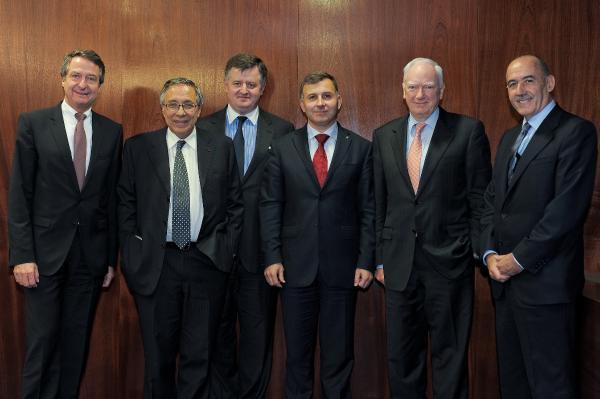
Europe’s leading public financial institutions have launched a pan-European infrastructure fund with an initial capital of EUR 600 million and invited other investors to join them in a First Closing by March 3, 2010. The Fund volume is targeted at EUR 1.5 billion for final closing in 2011.
Set up under Luxembourg law, the Marguerite Fund is a pan-European equity fund which aims to act as a catalyst for infrastructure investments implementing key EU policies in the areas of climate change, energy security, and trans-European networks. The Fund should serve as a model for the establishment of other similar funds in the EU wishing to combine a market-based principle of return to investors with the pursuit of public policy objectives.
Philippe Maystadt, President of the European Investment Bank (EIB), Augustin de Romanet, CEO of Caisse des Dépôts (France), Professor Franco Bassanini, President of the Cassa Depositi e Prestiti (Italy), Dr. Ulrich Schröder, Chairman of the KfW (Germany), José Maria Ayala Vargas, President of the Instituto de Crédito Oficial (Spain) and Zbigniew Jagiełło, President of the PKO Bank Polski (Poland) signed the official agreement, each committing his institution for EUR 100 million, on Dec. 3.
Marguerite is the first joint initiative of Europe’s leading public financial institutions. It has received the active support of the European Commission since it was initiated last year, under the aegis of the European Council, as part of the European Economic Recovery Plan. The European Commission has obtained the approval of EU Member States to contribute up to EUR 80 million to the Fund in support of the development of the Trans European Transport Network, subject to the approval of the European Parliament.
Marguerite is among the first “post-crisis” funds to be launched and is also one of the largest fund raising exercises in 2009 in Europe. It will provide equity or quasi equity to companies which own or operate infrastructure in the sectors of transport and energy “Trans-European Networks”, as well as renewable energy. The Fund is a long term investor (20 years) and is intended to be fully invested in four years. It will focus on asset creation (primarily greenfield investments). The investors in the Fund and other long term credit institutions, intend to establish a Debt Co-Financing Initiative of up to EUR 5 billion, providing a source of long term debt for the projects that Marguerite invests in.
The Fund will be advised by an independent advisory team whose key members are currently being selected. The advisory team will start work in the first quarter of 2010 and be responsible for originating and appraising potential investments. A Management Board will be responsible for overall management and administration of the Fund under the supervision of a Supervisory Board. The European Commission would have a seat on the Board. At the first meeting of the Supervisory Board, the six core sponsors agreed on the strategic orientations of the Fund and elected Philippe Maystadt as its President.
The advisory team’s incentive and remuneration scheme will be fully consistent with the general principles of long term performance endorsed by G20 Heads of State. It will provide performance-based incentives and a full alignment of the interests of the advisory team and the long-term interests of investors in the Fund.
The Marguerite Fund initiative was endorsed in December 2008 by ECOFIN and the European Council as part of the European Economic Recovery Plan (EERP). A cornerstone of the EERP is to reinforce Europe's long term competitiveness by combining EU policies and funds to help Member States maintain or bring forward investments, including investment in energy and priority infrastructure. The Fund will therefore focus on greenfield investments within its target sectors, namely (i) Transport, in particular trans-European transport networks (TEN-T), (ii) Energy, in particular trans-European energy networks (TEN-E) and (iii) Renewable Energies, including sustainable energy production, clean transport infrastructure, energy distribution and systems for hybrid transport (e.g. wind, solar (CSP and PV), geothermal, biomass, biogas, hydro, waste-to-energy projects).

Photographer: EIB ©To be defined
Download original

Photographer: EIB ©To be defined
Download original